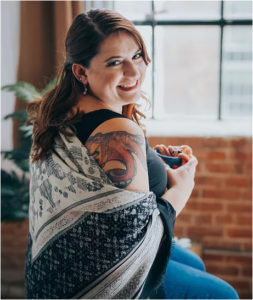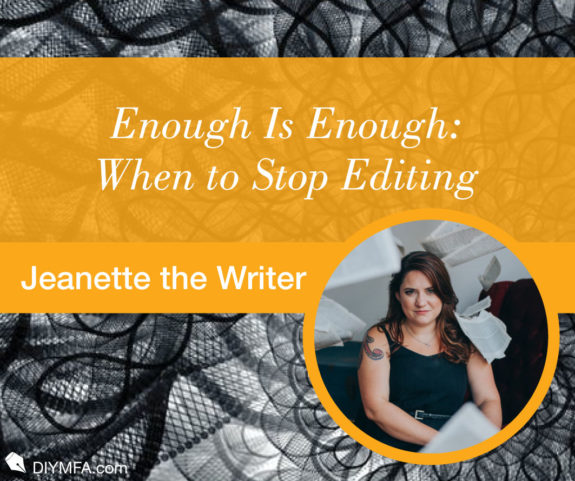There are a lot of questions I see come up over and over again when it comes to self-editing. Perhaps the most difficult of these to answer—how do I know when I can stop editing?
Here’s why we get trapped when it comes to this question. There’s no such thing as a perfect book. No such thing as an errorless manuscript. The “rules” of writing, even when it comes to grammar and punctuation, are fluid, which means there is no final “perfect” version available to us no matter how hard we try.
If there’s no such thing as perfect, then editing could go on until infinity. So, I ask again, how do we know when we’re done? The answer isn’t as easy as “it always takes this number of passes looking at these aspects.” But here are some factors that come into play when we decide enough is enough so you can stop editing.
How You Publish
Not every writer will need to complete by themselves or pursue with a professional every stage of editing—depending on how you are trying to publish.
If you are self-publishing, your book should go through, at minimum, a developmental edit (big story ideas), a line edit (paragraph-level issues and wording), a copyedit (grammar and punctuation), and a final proofread (to catch any last errors). You’ll want to have a mixture of self-editing and professional editing for these stages.
If you plan on traditionally publishing, your novel will also need these four stages, but you might have the help of your agent’s and publisher’s editors for copyediting and proofreading. You’ll still want to complete at least a developmental and line edit before trying to attract agents.
Law of Diminishing Returns
If we still need to do all this editing ourselves, how do we know when it’s done? This is where Gabriela would mention the law of diminishing returns. As simply stated as one can get with an economics principle, the law of diminishing returns is something like: when you invest effort into something, after a certain point—if nothing else changes—the profit from that investment will begin to decrease.
There are three stages to this principle: increasing returns, diminishing returns, and negative returns. Increasing returns happen on your first or maybe first few passes through your manuscript. You’re making big changes that are objectively altering the book for the better.
Diminishing returns begin when you reach the peak of your knowledge. Remember the phrase from our definition—“if nothing else changes.” If we aren’t acquiring new skills to apply to our manuscript, then applying our given knowledge will begin to have less of an impact as we continue.
We need to stop ourselves somewhere along the curve of diminishing returns before we slip into negative returns. This occurs when you’re “editing your manuscript to death.” Even bread dough has a point at which you can over-knead it. Don’t fall down the slope of negative returns so that you no longer recognize your beautiful work.
Goal Setting
It can be difficult to find the balance between making changes that help the manuscript and making changes for changes’ sake. Identifying when to stop is easier if you simply set a goal and stick to it.
For developmental editing, your goal may be a quick read through for structural issues (followed by a rewrite) and then a deeper developmental edit for any further plot holes or inconsistencies (followed by a rewrite).
Line editing, which includes word choice, could go on forever and ever. Again, it can be helpful to name a number of passes through the manuscript as a goal and then call it quits. Whether that’s just once or many more times completely depends on your level of comfort with this stage of editing.
Same for copyediting. Once may be enough to get all your commas in the right place. Or you may need multiple passes, some with the help of a grammar checker. When it comes to proofreading, make it a goal to set aside some cash because, let’s be honest, it’s better to hire a professional.
In the end, it’s all about goals. Tell yourself you will only do “X” number of passes for each level and stick to that. Otherwise you could find yourself on the revision hamster wheel.
That Gut Feeling
It’s difficult to tell you when to stop editing because there’s something to be said for that gut feeling. I, as an editor, cannot feel your gut feeling and therefore cannot fully advise you on what your manuscript needs.
But you know what it needs. I know you know.
One day, you’ll be reading through a paragraph and think “that’s really good,” and that’s when you stop tinkering and move on to the next stage or start querying/press publish.
Because we tend to doubt our guts or forget where we felt our gut speak up, I like to highlight sections in green when I know I’m done with them. It helps kick imposter syndrome to the curb when you see how much of your own writing you’ve perfected.
Overall, I wish I could give you a better answer. But the only way to do that is to have a professional look at your manuscript and evaluate your self-editing skills. Even then, it is ultimately up to you when you call it finished.

Jeanette the Writer is a freelance editor and writer based in Dallas, TX. When not at her computer, you can find her crafting, scuba diving, or posting pictures of her cats on Instagram. Visit JeanettetheWriter.com for more info and follow @JeanettetheWriter on Instagram and Facebook.







